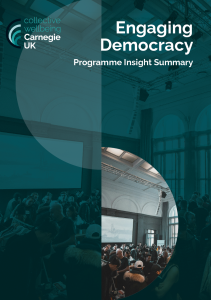- Democracy
- Adam Milne and Adam Lang, Carnegie UK
- 19 September 2024
- ISBN: 978-1-7384384-2-6
Summary
In August 2023 Carnegie UK began a programme of engagement to help improve our understanding of participatory and deliberative democracy’s ability to deliver democratic wellbeing. This work had a particular focus on understanding the relationship between voice in decision making, power, and existing democratic structures. This report captures the insights, ideas and observations generated from this programme of work, with findings grouped together in areas of thematic interest.
Key findings

Citizens’ assemblies can improve trust in democracy and decision-making, but only if they are well designed and lead to real change.

If participatory or deliberative process are not delivered to a high standard then they risk increasing the disconnect between individuals and our democratic structures.

Participants may be left with lower levels of trust than they started with if there’s no follow up to their involvement and no action taken.
Research
Carnegie UK defines Democratic Wellbeing as the degree to which we have agency or a say in the decisions that affect our lives.
Despite its central importance, our 2023 Life in the UK report found that Democratic Wellbeing was the area with most cause for concern across all nations of the UK with a widespread lack of trust in the UK’s political systems and institutions. For example, 73% of people in the UK feel that they cannot influence decisions affecting the UK as a whole.
Methodology
This research tries to find an answer the following question:
Do you make the problem of trust in democracy worse, if people take part in a deliberative process and this leads to no discernible impact/change?
Through a mixture of workshops, interviews and expert analysis, we brought people together that have taken part in citizens assemblies, panels and juries in Scotland to understand their views and experiences of these events. We also reached out to those that commissioned, designed and facilitated these same events to understand their perspectives and to ultimately find out more about how these events brought about change.
This work was supported by a group of Democratic Wellbeing Champions, individuals from across the UK with diverse experiences of influencing policy across civic life via wellbeing, democracy, community organising and social change.
The research summarised in this report was based on engagement with participants in and commissioners of participatory or deliberative democratic processes that took place in Scotland. However, the following recommendations have been co-produced by the group of 13 Democratic Wellbeing Champions from across the UK that was established to support this programme of work.
Conclusions
- Participatory democratic processes most usefully contribute to Democratic Wellbeing if they are designed and delivered to high standards of inclusion and accountability.
- If a high standard is not achieved in the design, delivery and subsequent accountability mechanisms for a participatory or deliberative process then they risk increasing the disconnect between individuals and our democratic structures.
- Participants in these processes may be left with lower levels of trust than they started with if they are told their views matter but are not informed about how they are acted on or taken forward.
Recommendations

Increase the quality of participatory democracy by establishing minimum standards of delivery and accountability.

Build the democratic literacy of decision makers to encourage them to more effectively share power with those working at a local level.
Use the 2024 moment and potential for change to deliver better Democratic Wellbeing.
Help us make the case for wellbeing policy
Keep in touch with Carnegie UK’s research and activities. Learn more about ways to get involved with our work.
"*" indicates required fields
